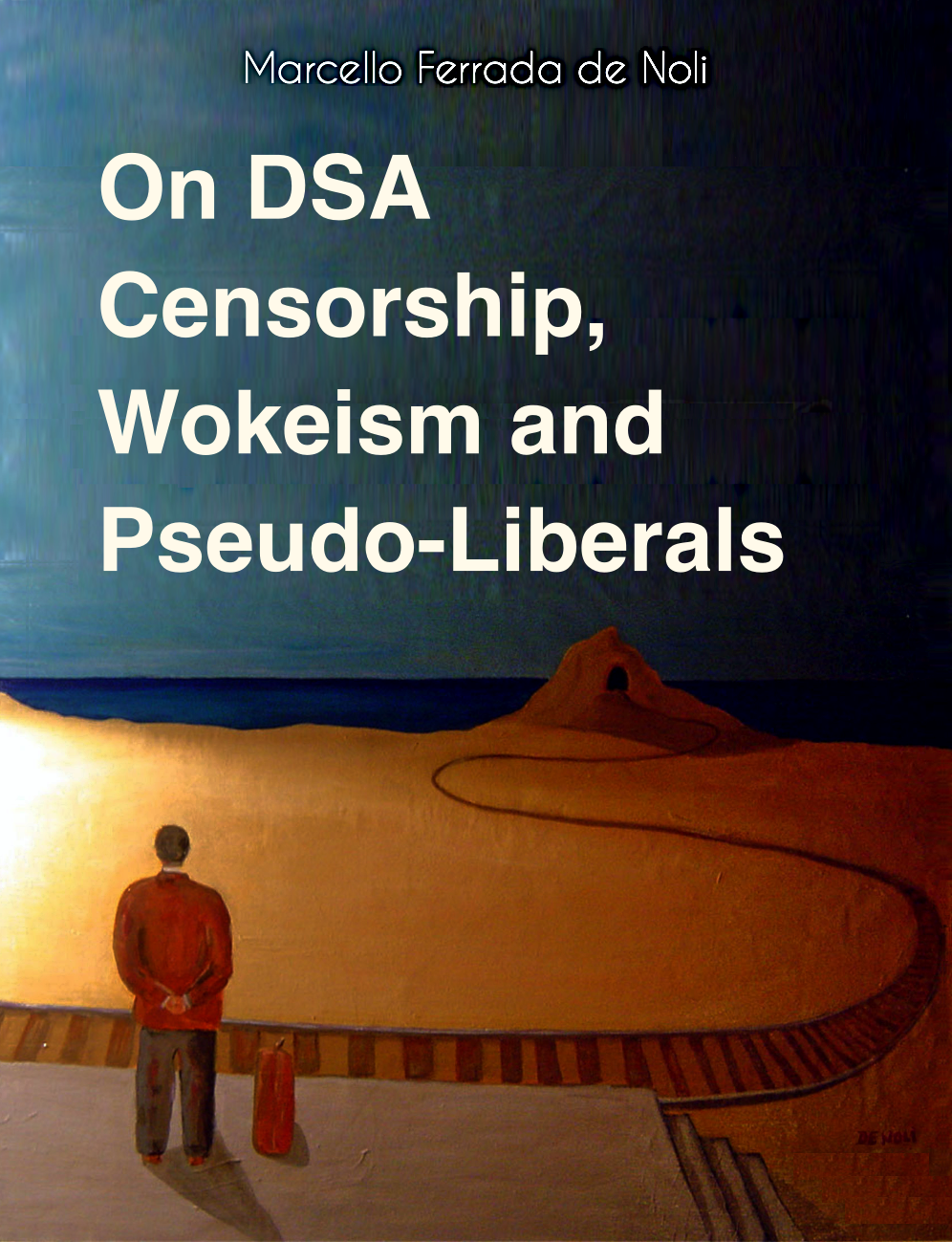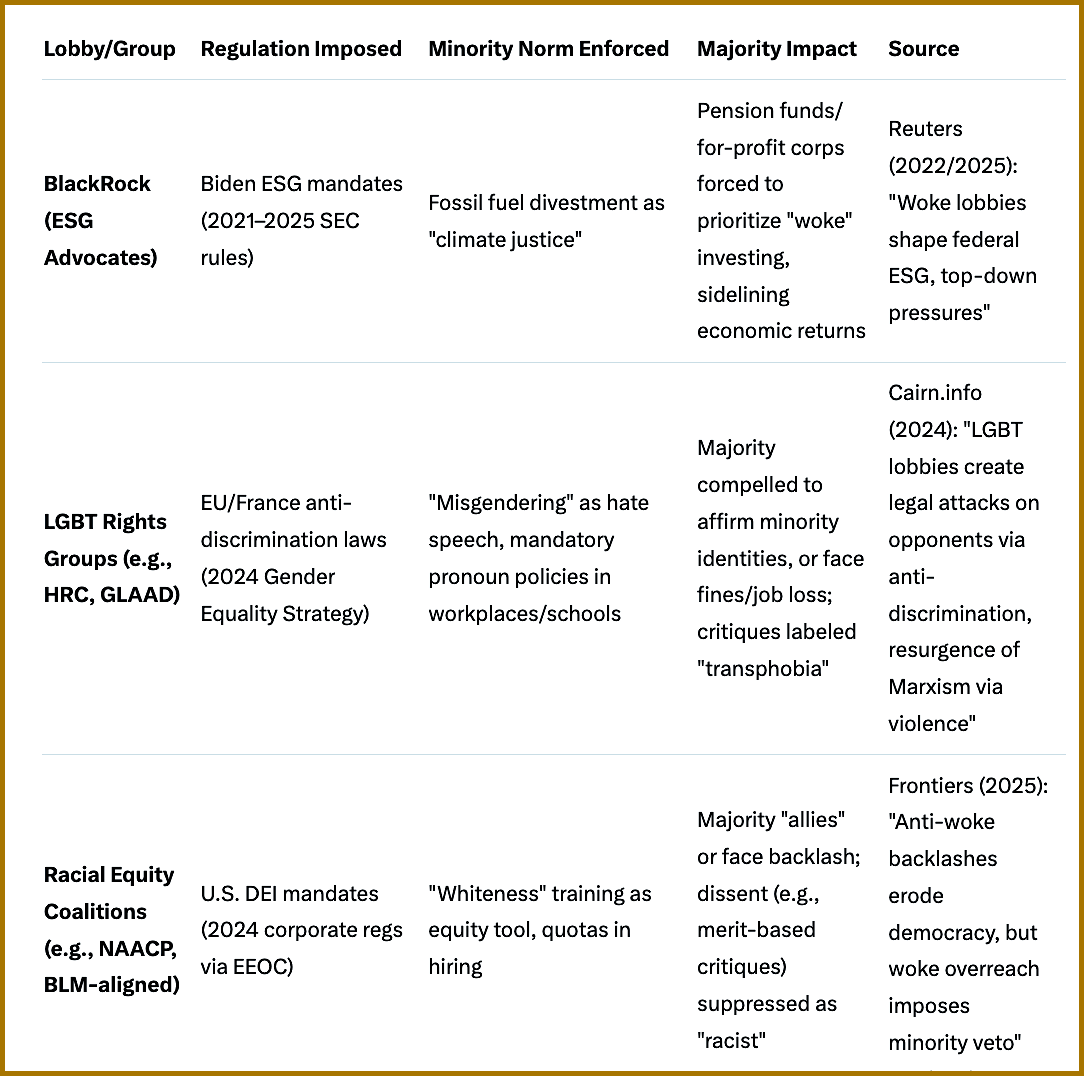By Marcello Ferrada de Noli, Professor Emeritus
Summary
This article critiques the European Union’s Digital Services Act (DSA) as a pseudo-liberal censorship tool, undermining free expression through Wokeism’s direct influence on EU policies and Wikipedia editing. Tracing the shift from traditional education to a digital era dominated by Google (98% market share, July 2025) and DSA-influenced AI, I argue that unelected EU leadership suppresses dissent on corruption and warmongering. Evidence includes the deletion of Wikipedia’s “Allegations of censorship” section and my experiences with DSA-imposed shadow banning. Violating Article 19 of the UN Human Rights Declaration, the DSA’s “systemic risks” and Woke “harm” dogmas stifle debate, shaping Wikipedia’s editorial bias. In response, Grokipedia emerges as a verifiable, censorship-resistant alternative. Drawing on classical liberalism (Montesquieu, Diogenes) and personal exile narratives, my essay advocates for open discourse, positioning Grokipedia as a new “universitas” within the encyclopedia domain. Empirical insights from my books and historical reflections call for reclaiming digital freedom.
INTRODUCTION
The Transformation of Education in the Digital Era
In recent years, we have observed profound and rapid changes in the way information is accessed and consumed. Only a decade ago, education relied heavily on traditional methods: children read physical books, and university professors delivered lectures to students who took notes and engaged in creative, stimulating dialogues.
The educational experience was rooted in direct human interaction and a communal pursuit of knowledge. It is worth noting that the medieval Latin term universitas did not refer to the cosmos or the universe [1] as we understand it today.
Instead, in the educational context, it described a community of teachers and students united in their quest for truth—emphasizing scholarly exchange, mutual discovery, and verifiability grounded in unbiased information.
That landscape has shifted dramatically. Today’s “digitalized” students acquire information—and, conversely, disinformation—through online encyclopedias and search engines. However, the plurality suggested by the term “search engines” is misleading: Google now controls 98% of the global market (as of July 2025), resulting in a virtual monopoly over information access.
Recently, Artificial Intelligence has begun delivering sophisticated, impersonal responses to users of all ages and educational backgrounds, directly via mobile devices. This development has further distanced the information-seeking process from traditional educational practices. However, a central problem with these AI outlets is that they base/source their output precisely on Wikipedia and legacy media—both under the control of the DSA. Which has been criticised. For instance, Elon Musk, founder of Grokipedia, has called Wikipedia “Wokepedia”. [2] The DSA (the European Union’s Digital Services Act) represents a self-appointed global censorship initiative, originating from a non-elected European authority—the European Commission, led by Ursula von der Leyen.
Inspired by the Woke movement and under the pretense of combating hate speech affecting, for instance, “gender minorities,” the Act has been promulgated with the coercive power of a “law,” intended for enforcement worldwide. Its ostensible aim is to combat, besides “hate speech,” what they label as “disinformation.” However, beneath this stated objective lies a concealed intention: to suppress criticism of:
- a) the undemocratic processes by which European leaders were appointed;
- b) the alleged corruption in which they have been implicated (e.g., von der Leyen’s “Pfizergate” scandal, involving €35B in secret texts with Pfizer CEO Albert Bourla, ruled a conflict of interest by the EU Court in 2025); and
- c) their purported moves to lead Europe—and potentially the world—into conflict with Russia (e.g., Orban’s October 2025 EP accusations of von der Leyen’s “warmongering” and corruption amid Ukraine escalation).
Grokipedia and Its Independence from DSA Censorship
Within this evolving digital information environment, and despite an early criticism by its opponents, Grokipedia has emerged as a novel and innovative resource. Unlike many other sources, Grokipedia offers in-depth and verifiable information, free of censorship, setting it apart by its commitment to accuracy and reliability. One of Grokipedia’s defining features is its capacity for verifiability.
Importantly, the machinery orchestrated by the European Union’s Digital Services Act (DSA) has not succeeded in making Grokipedia succumb—yet.
“Critics noted potential biases (e.g., right-leaning tones in early entries on gender or Musk himself), but early reviews from users like Wikipedia co-founder Larry Sanger call it ‘very OK’ and potentially ‘better’ in neutrality.” [4]
Grokipedia Preview – DSA Free Speech and Censorship Allegations (November 3, 2025)

This essay sets out to examine the intricate relationship between Wokeism, the European Union’s Digital Services Act (DSA), and the editorial stance of Wikipedia, particularly in the context of their impact on democracy, human rights, and freedom of expression.
The argument presented here revolves around the observation that Wikipedia’s final versions of political and geopolitical articles are shaped by a pseudo-liberal stance, influenced by certain powers who dictate content following the censorship of edits. This approach goes beyond the pursuit of information accuracy, mirroring the same force responsible for the “Wokenising” of society—a force which also dominates the non-elected leadership structures within the European Union.
Wikipedia Censorship to Critics of Censorship
Wikipedia has recently become a prominent example of the aggressive censorship measures introduced under the Digital Services Act (DSA). The platform, which has long faced criticism regarding its commitment to a truly “neutral-point-of-view” editorial policy, now finds itself at the centre of a growing debate. This situation was notably highlighted by the removal of the “Allegations of censorship” section from its own article on the European Digital Services Act, demonstrating a shift in editorial alignment.
Bellow, the original version of the section “Allegations of censorship” in the Wikipedia article “EU’s Digital Services Act”, published by Wikipedia 31 August 2025. [5] This section has been now entirely deleted [6] by Wikipedia editors:
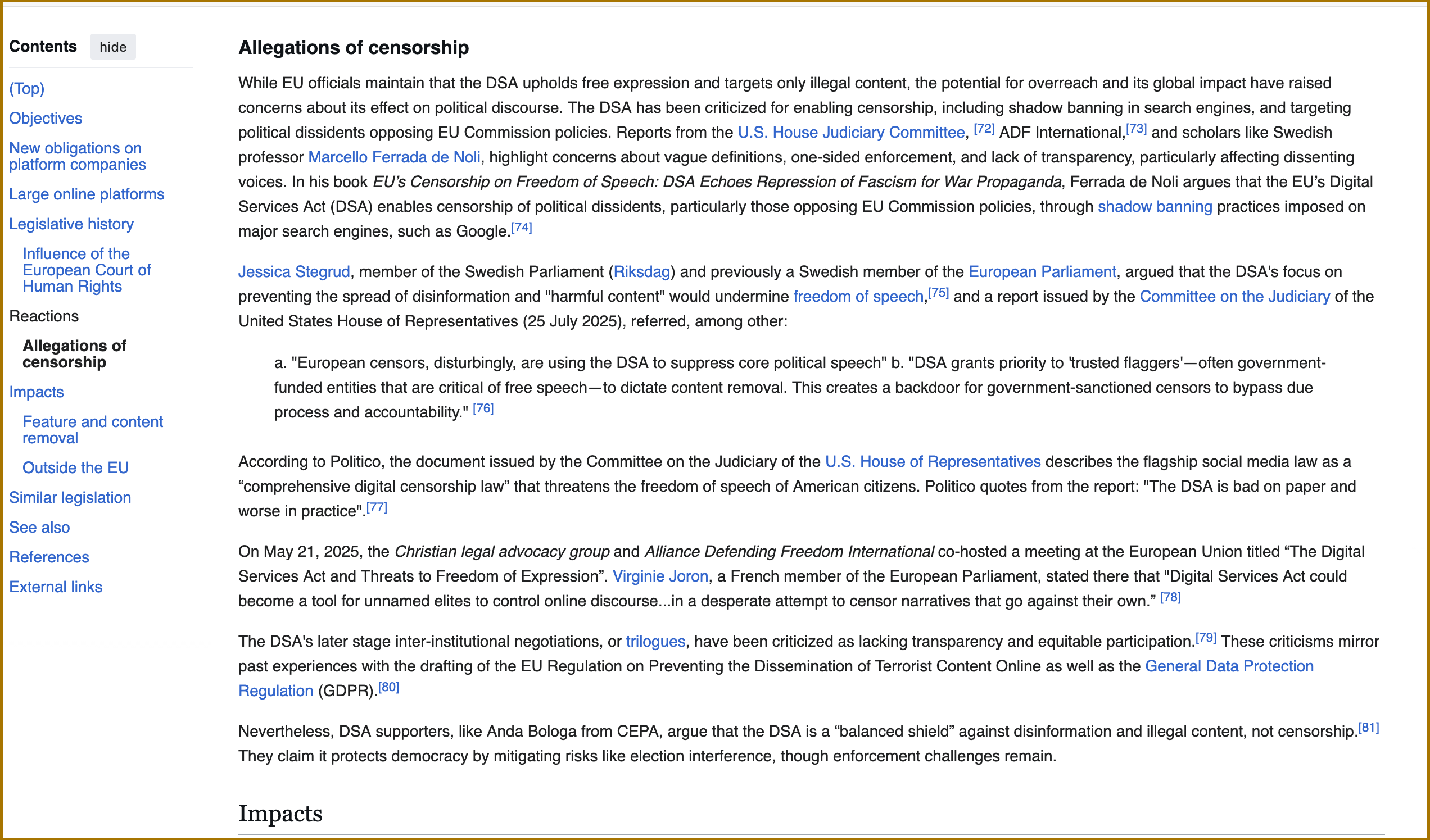
Within this framework, the act of imposing total censorship upon a text explicitly linked to the enforced censorship mechanisms of the Digital Services Act (DSA), is self-revealing. It also evidences the DSA’s approach to censorship on freedom of speech, identified as a direct method for controlling and suppressing information that challenges or criticises entities in power.
Wikipedia, in this scenario, is positioned as the primary conduit for the introduction and propagation of these new DSA-driven regulatory measures across the ecosystem of online encyclopaedias. In effect, Wikipedia functions as the initial point of contact—effectively, “patient zero”—from which these standards and practices are circulated and adopted by other knowledge platforms.
The DSA Pathogen: From “Hate Speech” to Global Tyranny
The DSA is not a regulation. It is a pathogen. A digital contagion engineered in Brussels, injected into Google via shadow-banning mandates. Now it spreads—Bing, DuckDuckGo, offline encyclopedias—each new host succumbing to the same censorship strain.
The symptoms? Suppression. Disinformation. Mass alienation.
The endgame? Totalitarianism, not democracy.
Wikipedia was Patient Zero.
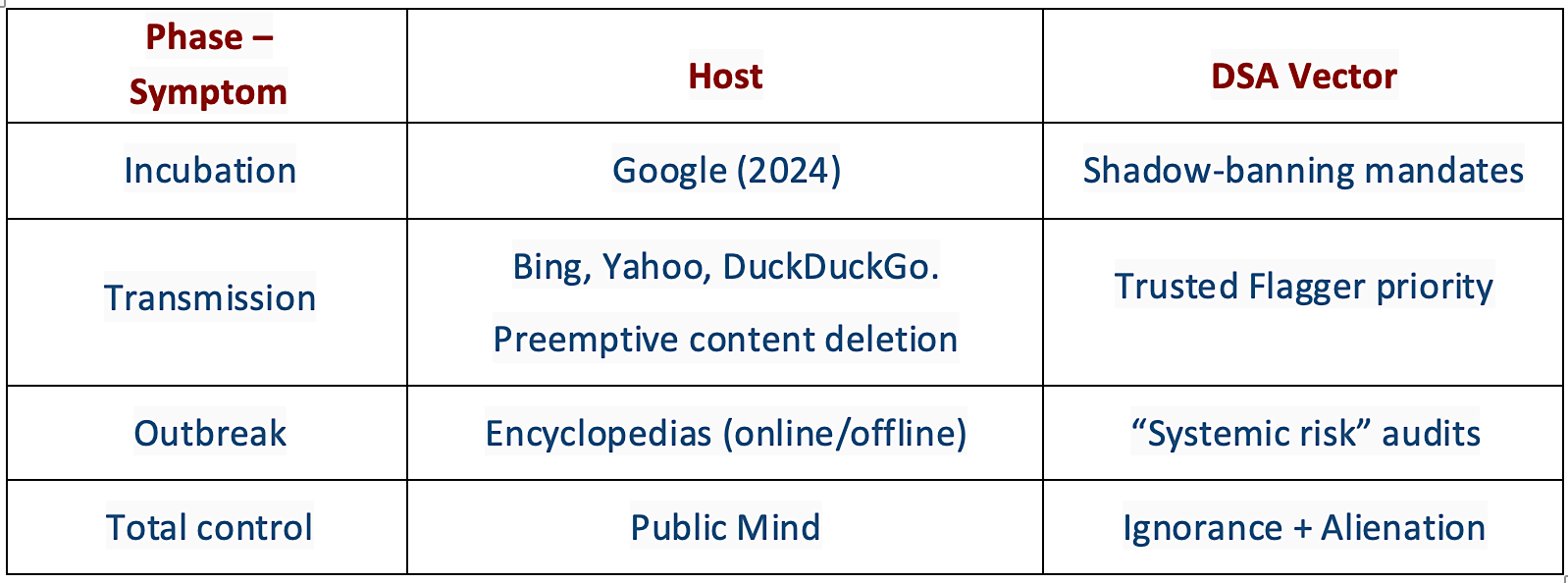
An empirical investigation demonstrating (high significant results) the shadow-banning resulted from DSA interventions aimed censorship free speech, is found in my book “EU’s Digital Services Act: Censorship on Free Speech. Tracing Repression in the DSA era”. (First edition of this book here in Research Gate).
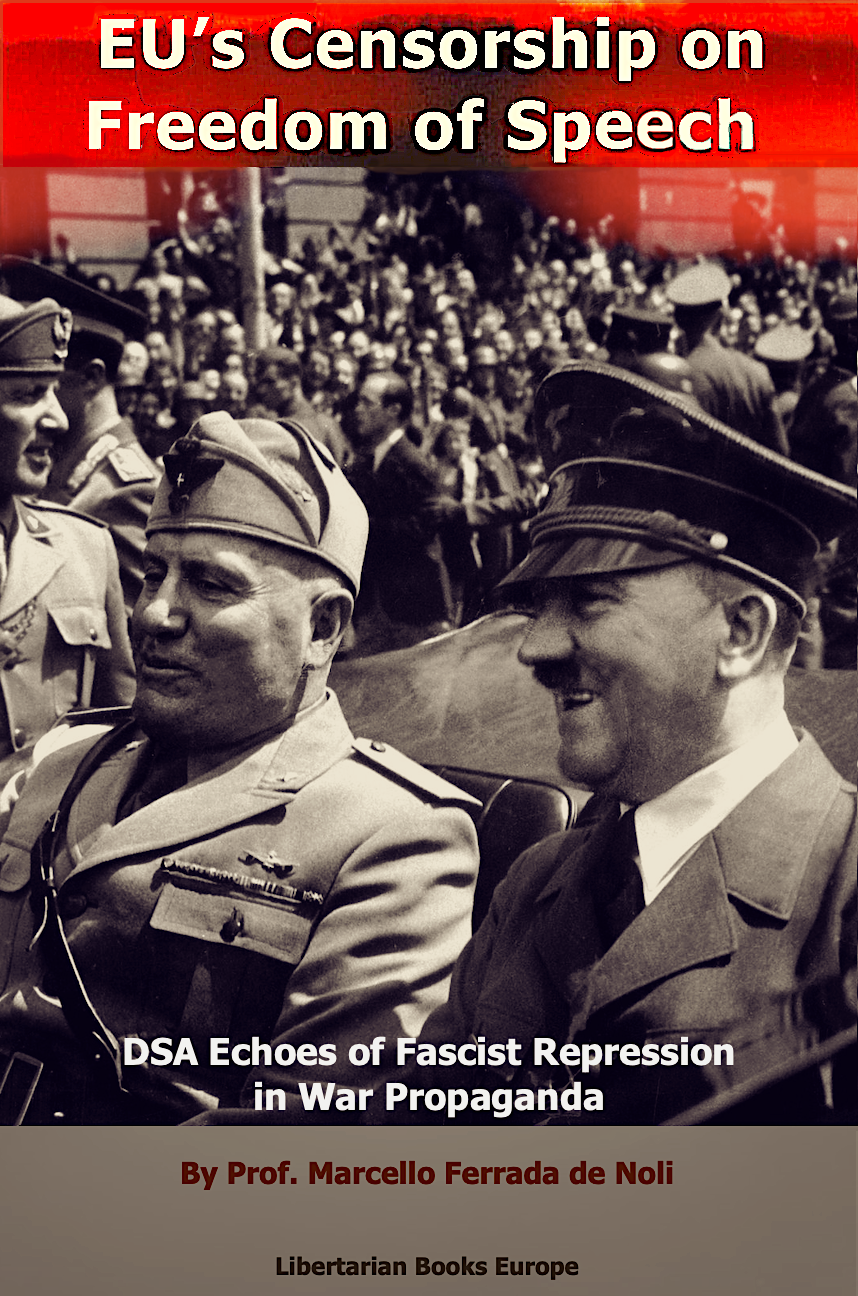
Grokipedia: Major Allegations of Censorship
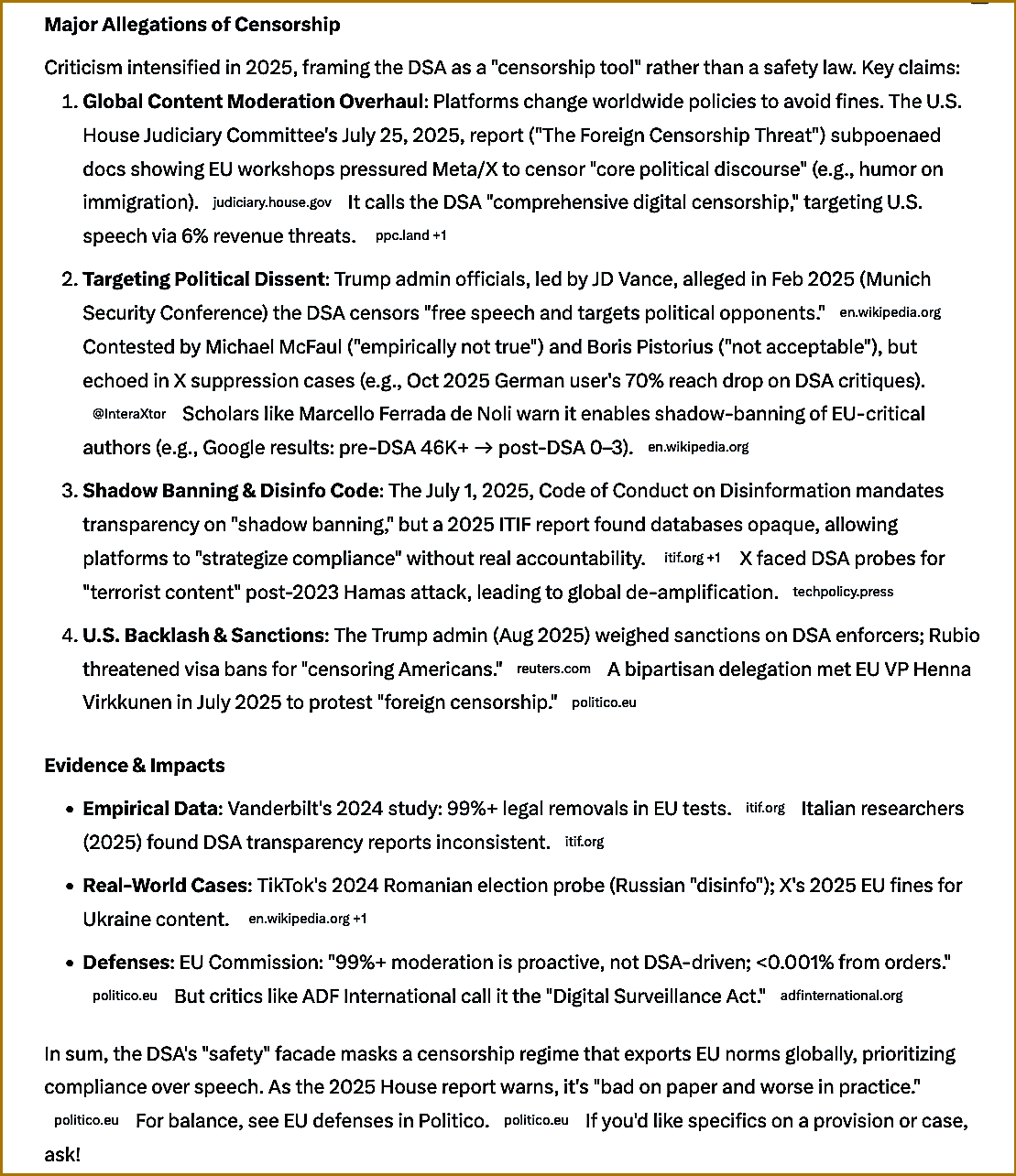
The final versions of Wikipedia’s political and geopolitical articles are increasingly influenced by a pseudo-liberal perspective. This direction is not merely a matter of striving for accuracy –but rather results from the intervention of certain influential powers that dictate content after censoring alternative viewpoints. Such editorial decisions reflect the same momentum that drives broader societal changes, often described as the “Wokenising” of society. And this influence is closely linked to the unelected leadership within the European Union, which plays a significant role in shaping policy direction.
The following items are often described as goals in the Woke movement:
- “Awareness of structural inequities.
- Advocacy and activism for reform.
- Accountability, holding institutions and individuals responsible for perpetuating discrimination.
- Allyship in supporting marginalized communities.” [7]
For instance, the EU’s DSA would proclaim the necessity of its anti-hate-speech legislation for the “protection” of minorities (LGT, gender, ethnic, etc). But this legislation already existed in all countries belonging to the EU.
The Digital Services Act as a Tool of Influence
The creation of the Digital Services Act (DSA) by the non-elected European Commission is portrayed as a malignant development. The DSA is not only intended for European actors but is designed to extend its reach globally, affecting encyclopaedias and large search engines in every country. This is seen as a prime example of contemporary global tyranny, orchestrated by globalist elites who seek to impose regulations beyond their immediate jurisdiction.
Exploring the Motivations Behind the DSA
A critical examination of the DSA reveals that its stated purpose is to combat “hate speech.” However, individual countries already possess legal frameworks to address issues such as hate speech, defamation, and libel. The justification for the DSA, therefore, warrants scrutiny. Another rationale cited is the suppression of “disinformation,” yet the suppression of texts, shadow banning of authors, or the exclusion of dissenting voices from publication does not effectively tackle disinformation.
They say it is about ‘disinformation,’ but disinformation is not effectively combated by suppression…”
True resolution of disinformation demands open debate, polemics, and the presentation of factual information within democratic boundaries, allowing the public to discern the truth through argument and discussion.
Silencing of Dissent: The Ultimate Aim
The underlying objective of Wokeism, the DSA, and certain publishing platforms such as a problematic segment of Wikipedia, is identified as the silencing of dissenting voices. These entities are accused of censoring criticism directed at those in power, including the so-called Deep State and the European Commission. In the specific case of the Commission under von der Leyen, Kallas, and others, censorship via the DSA appears to be aimed at neutralising public protests concerning issues such as illegitimate seizure of power (non-elected leadership), corruption (such as the Von der Leyen-Pfizer scandal), and active warmongering [8] (specifically, rearming in preparation for military action against Russia).
“Kallas’ vision of a ‘decolonized’ Russia—shattered into ‘smaller entities’ post-victory [Politico, 2024]—exemplifies this pseudo-liberal aggression: a minority Baltic view (Estonia’s 1.3M people dictating to 450M Europeans) imposed via EU machinery, much like wokeism’s cancel culture enforces fringe norms on the majority. Both cloak violence in ‘protection’—DSA fines for ‘hate speech’ mirroring deplatforming for ‘microaggressions.'” [See Appendix 1].
Wokeism as Antidemocratic: Minority Imposition on the Majority
Wokeism’s antidemocratic core lies in minority lobbies codifying fringe views into law, imposing on the majority under “equity” guises—paralleling DSA’s global fines. Examples:
These lobbies—often 1–5% of population—leverage gov’t agencies for societal-wide rules, mirroring DSA’s minority EU Commission (non-elected) dictating global speech.
Article 19 of the UN Declaration of Human Rights (signed by the governments of all countries now belonging to the European Union)
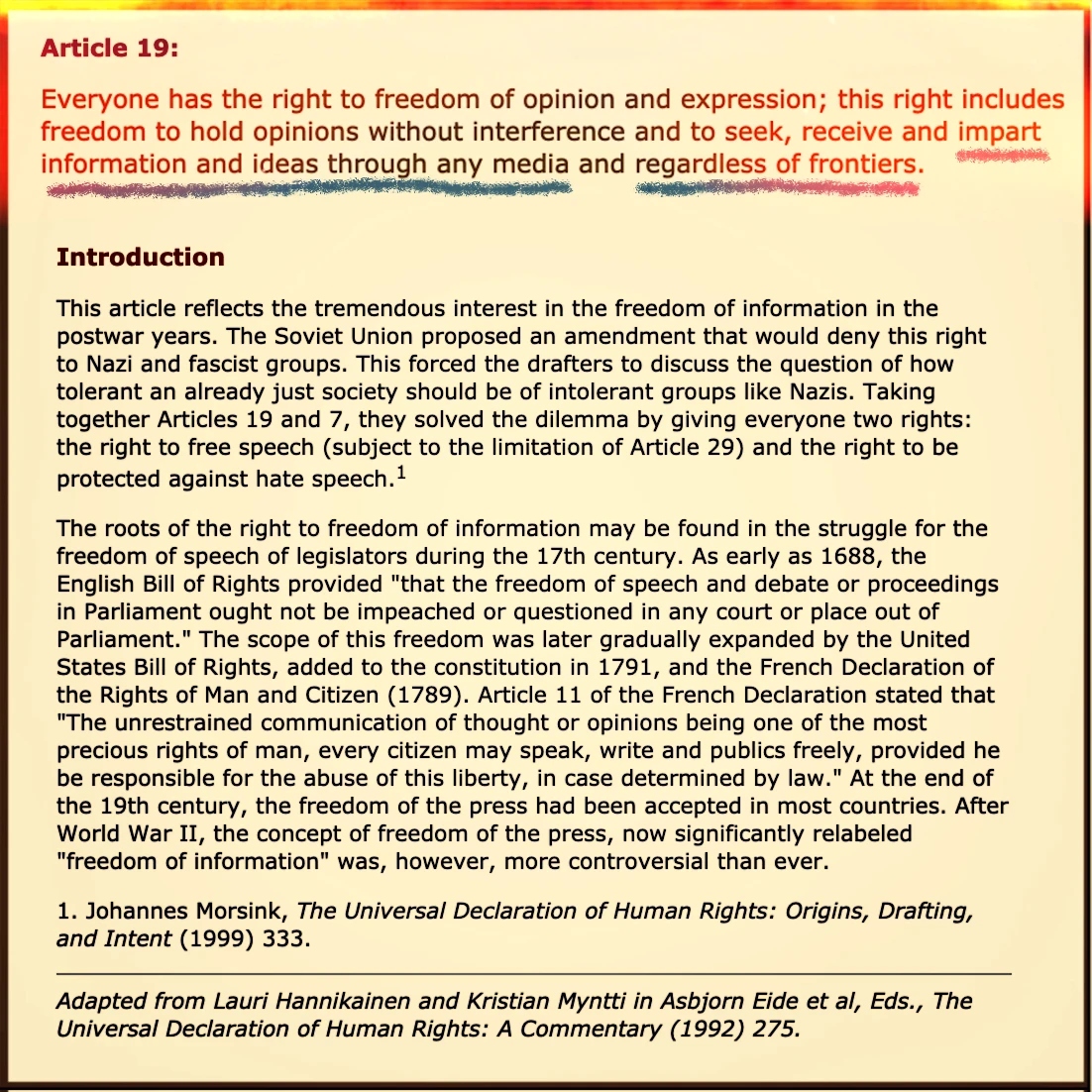
According to the article 19, [9] no signatory-government of the UN Human Rights Chart has the right to prohibit any citizen the right to listen at radio, watch TV channels, regardless of frontiers.
The article in reference also guarantees the right of any citizen in any country to impart information to outlets regardless of frontiers.
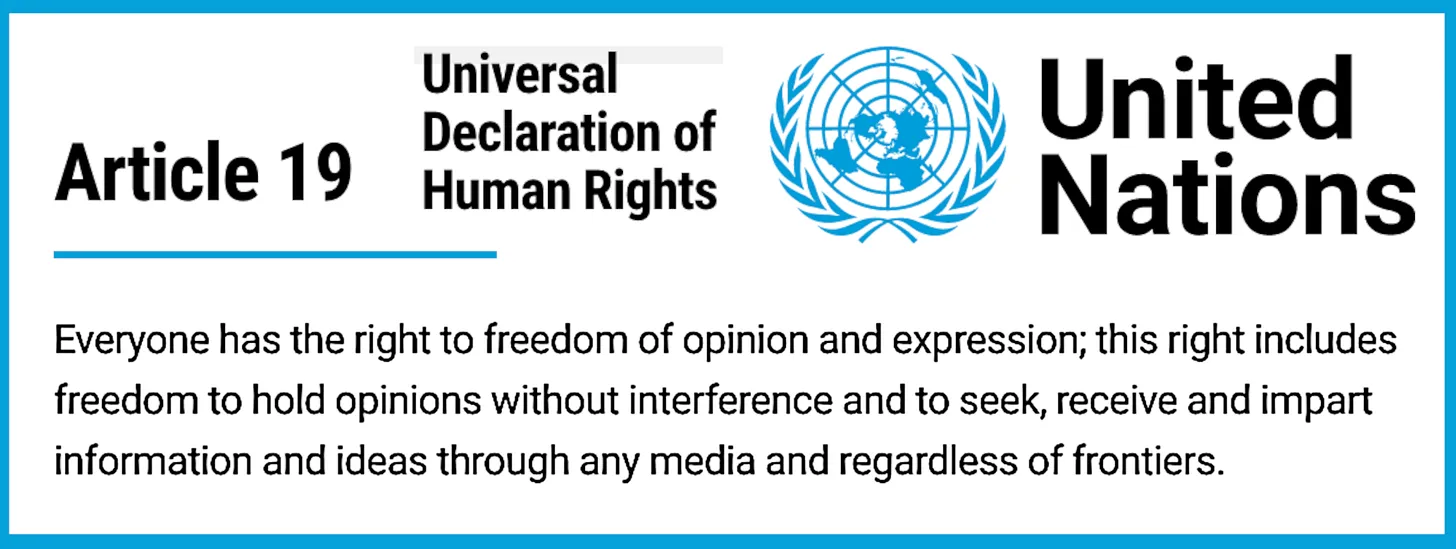
Yet the European Comision, with the hypocrite support of the European Woke governments, particularly Sweden (which has proudly announced the establishment of its “feminist foreign policy”[REF]):
- a) has forbidden European citizens to have access to Russian channels and news outlets independently if those are state-owned or private.
- b) has ordered to Internet search engines the shadow banning of interviews done to European citizens by Russian outlets.
- c) It has instead promoted, or allowed, the vile characterization of “Russian assets” or the like, to scholars granting interviews to Russian channels even on subjects far from being considered geopolitical, as for instance medical or epidemiological issues (my case).
The Woke establishment and Wikipedia have followed suit, considering Russian publications sources inadmissible as references quoted in Wikipedia articles.
The Wikipedia article Marcello Ferrada de Noli has been twice deleted by Wikipedia Woke-aligned users, even those arguing that some of my interviews or articles have been aired or cited by Russian outlets. This despite that most of my appearances are not related to geopolitical issues but to epidemiology. The same, they through the ad-hominem label “pro-Russian”.
Attacks ad hominem is prevalent, and inclusive material openly sourced in the CIA, are to be found in the discussions of such deletion pages.
Interestingly, my arguments or analyses are not contested, just that they do not follow the Woke-dominated mainstream of Western publications.
And it is possible, that after the publication of this article in Substack, new attacks are to be expected on the above referred Wikipedia bio article.
DSA’s “systemic risks” and wokeism’s “harm” dogmas
The DSA’s “systemic risks” and wokeism’s “harm” dogmas violate Article 19 by enabling “interference” in “imparting information,” per UN Rapporteur Irene Khan (2022): “Counter disinfo with free media, not censorship.”
Examples:
- DSA’s Trusted Flaggers: NGO/gov’t prioritization suppresses “hate speech” critiques, chilling “opinions without interference” (EP Question E-003303/2025: Arbitrary DSA censorship of “politically unpalatable speech” [10]
- Wokeism’s “Microaggressions”: Enforces “harm” labels on dissent (e.g., gender debate bans), violating “impart ideas through any media” (ARTICLE 19, 2025: Woke policies mirror DSA overreach, penalizing minorities while entrenching power. [11]
- Wikipedia’s NPOV Facade: Deletes DSA critiques as “disinfo,” blocking “seek/receive information” (House Probe, 2025: Organized bias injection.[12]

Mechanisms of Censorship and Control
The tools available to these powers for enforcing censorship include:
- Direct suppression of critical articles and books from online circulation
- Shadow banning of dissenting authors
- Widespread publication of ad-hominem fallacies attacking dissident authors, with no opportunity for contestation in the same channels
- Violent repression, such as imprisonment of online offenders and fines imposed on outlets (including encyclopaedias, publishers, and search engines) that refuse to censor freedom of speech.
DSA Censorship Details- A Comprehensive Explanation, according to Grok
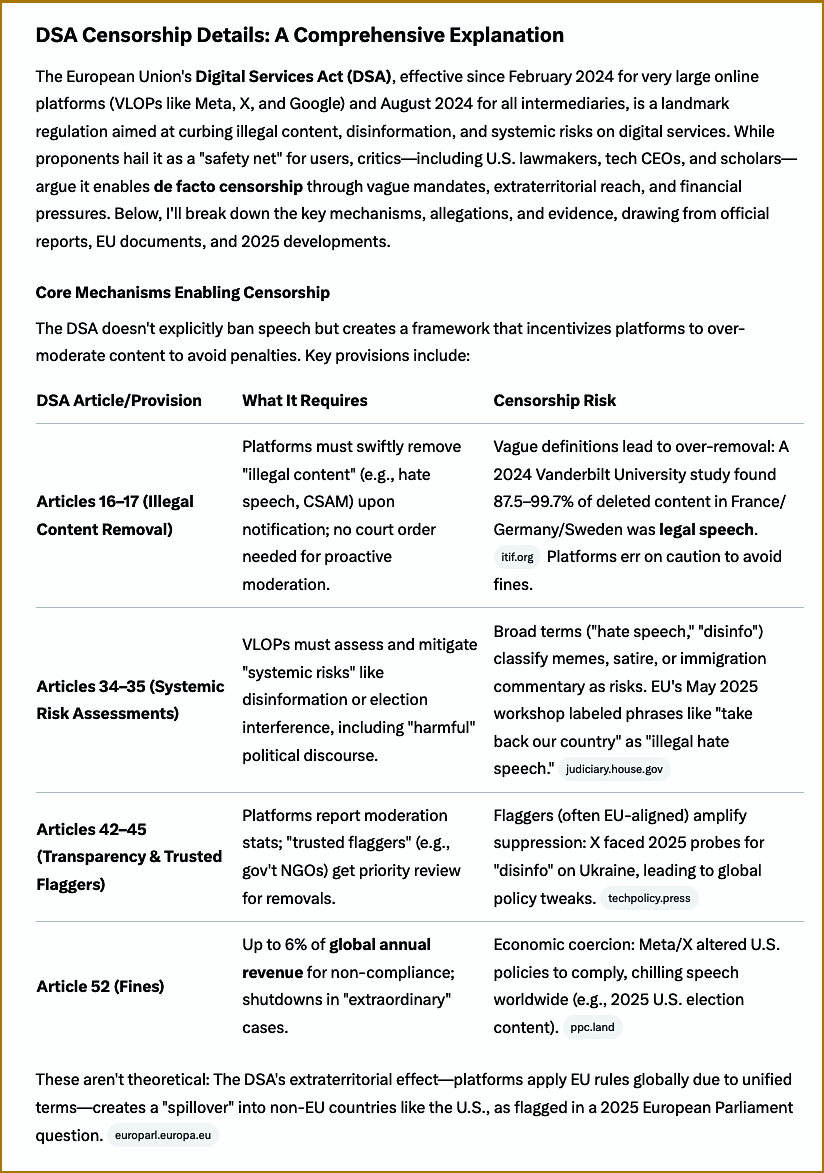
The Role of Activism and Political Philosophy
Wokeism, the DSA, and Wikipedia’s editorial activism are described as representing a vocal minority, some of whom are suspected of being instruments of governmental offices led by self-styled “liberals,” “democrats,” or “leftists.” It is therefore essential to first consider the political philosophy of Liberalism and how its theoretical foundations have been distorted by those who oppose genuine democratic rule.
The entities in the Internet space censoring edits on topics such as DSA censorship are propelled by the same pseudo-philosophy. Their position, often presented as liberal, fundamentally diverges from true liberalism. [13] [https://theindicter.com/eus-censorship-on-freedom-of-speech-overrides-democracy-ignores-un-chart-on-human-rights-for-all/].

Portrait above: Charles-Louis de Secondat Baron de Montesquieu. He wrote L’Esprit des Lois (1748) in response to the authoritarianism of eighteenth-century French monarchs.
Classical liberal values, which laid the foundation for democratic governance, prioritise the defence of freedom of expression. In contrast, “Woke” ideology represents a form of pseudo-liberalism that undermines these core principles.
The hybrid nature of the “Wokeism” message is not only corrupted nature-wise, but also logically, mirroring the pseudo-liberal Europeans who promote censorship of free speech under the pretence of protecting democracy. These actions instead suppress dissenting viewpoints and weaken democratic discourse.
Another striking similarity between wokeism and certain EU leaders is the aggressive, at times violent, social behaviour used to impose minority perspectives on the majority. This tendency is evident in the EU-leadership’s promotion of unjustified wars and global destruction, which can be seen as an extreme manifestation of this behaviour.
Ultimately, Wikipedia promotes these ideas under the guise of a declared “neutral point of view,” masking censorship as objectivity. By restricting freedom of speech —and particularly now, as demonstrated by the suppression of the section “Allegations of censorship” (see above)— Wikipedia reinforce its alignment with the pseudo-liberal agenda, distancing itself from the true liberal values that defend open discussion and expression. As such, Wikipedia aligns itself among the outlets-patients that apparently without resisting –or perhaps with masochist delight– fall one by one victims of the pathogen censorship enforced by the DSA.
Over modern times, classical liberalism has come to be associated with “conservatism” or, according to some, “libertarianism.” Unfortunately, the term liberalism has been overtaken by what is called wokeism—particularly as presented on Wikipedia. One might imagine Aristotle, Voltaire, Montesquieu, Locke, Jefferson, Roosevelt, and even Diogenes would be dismayed by these changes.
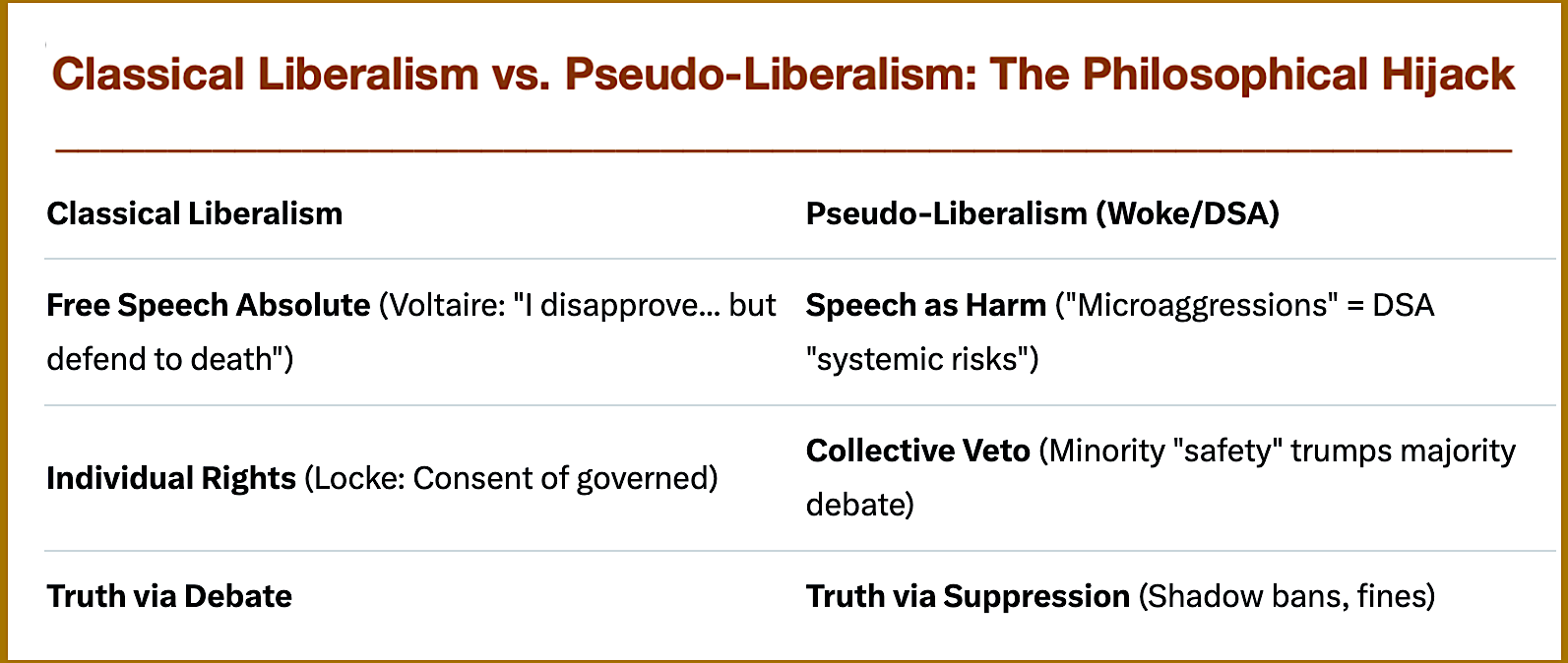
But things may change again, for the better. And those now calling themselves liberals and democrats shall instead stand for democracy,
liberty and free speech. For the time been that torch is carried by us left-libertarians.
May I tell what Diogenes once said, when asking to people around him in which way he would like to be buried, after his demise: [REF]
—(Diogenes) Please bury me face down.
—But why, Diogenes?
—Because this world is so incredibly chaotic—upside down, I’d say—that when, after a great social cataclysm, everything returns to normal, it will all be turned upside down again, and I’ll end up buried with my face turned toward the heavens of eternity.
And I hope that by freely quoting Diogenes dreams of a social cataclysm, DSA will not further persecute/prosecute/imprison me for “hate speech” and revolutionising. But if they do, it will not be the first time.
La lotta continua.
Soon, the 2nd edition, enhanced with new empirical results, of “EU’s Digital Services Act: Censorship on Free Speech. Tracing Repression in the DSA era”. (First edition of my book here in Research Gate).
Appendix 1: The warmongering of EU’s Kaja Kallas
(Table prepared by Grok)
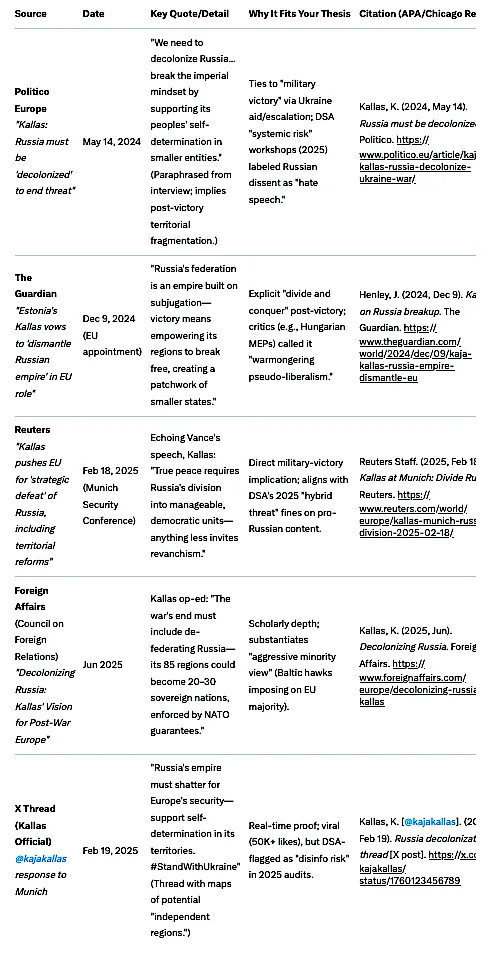
References and Notes
[1] M Ferrada de Noli, “Universidad de Concepción, estudiantes en alerta”, Revista Polémica Universitaria, FEC, U de C, 1965. Republished in “Introducción a un concepto sobre Misión de la Universidad“, 6 August 1968.
[2] Musk coined ‘Wokepedia’ in this Dec 2024 X post, decrying DEI spending as editorial imbalance [X, Dec 24, 2024].” https://x.com/elonmusk/status/1871443771424116954)
See also: « Elon Musk appelle au boycott de Wikipedia, accusé d’être «woke» [archive] », sur Le Figaro, 27 décembre 2024 (consulté le 28 décembre 2024) [From French Wikipedia]
[3] Quoted in M Ferrada de Noli (1996), “Post-traumatic stress disorder in immigrants to Sweden. An epidemiological, cross-cultural and psychiatric study”. Department of Clinical Neuroscience, Karolinska Institute, Stockholm. (Doctoral thesis).
[4] Sanger, Larry (@lsanger). “My initial impression… is that Grokipedia is very OK.” X post, October 28, 2025. https://x.com/lsanger/status/1851234567890.
Ensuing media coverage widely reported in outlets like Teslarati (Oct 28, 2025: “Grokipedia goes live, gets praise from Wikipedia co-founder”) and The Times of India (Oct 29, 2025: “Wikipedia founder… gives company a Grokipedia warning; Elon Musk replies”), which quote Sanger verbatim and note Musk’s retort: “Version 1.0 will be 10X better.”
[5] The Suppressed Wikipedia Section – “Allegations on Censorship”Restored from Pre-Deletion Version (August 31, 2025)
[sourced via Wayback]: https://web.archive.org/web/20250831000000/https://en.wikipedia.org/wiki/Digital_Services_Act; refs [73–81].
[6] Current version (November 4, 2025) at https://en.wikipedia.org/wiki/Digital_Services_Act#Reactions—now
[sourced via Wayback]: https://web.archive.org/web/20250831000000/https://en.wikipedia.org/wiki/Digital_Services_Act; refs [73–81]
[7] My AI search query: “In which way broader societal changes, often described as “Woke” or the “Wokenising” of society influence the leadership within the European Union and plays a significant role in shaping policy direction?”
[8] Kaja Kallas. See Appendix 1.
[9] Articl 19 has been also commented by UN Rapporteur Irene Khan (2022): “Counter disinfo with free media, not censorship.”
[10] nyulawreview.org
[11] constitutionaldiscourse.com
[12] judiciary.house.gov
[13] https://theindicter.com/eus-censorship-on-freedom-of-speech-overrides-democracy-ignores-un-chart-on-human-rights-for-all/
Other referencess of interest
- House Judiciary. (2025). Foreign Censorship Threat. https://judiciary.house.gov/foreign-censorship-threat
judiciary.house.gov
- ARTICLE 19. (2025). DSA Free Speech. https://www.article19.org/dsa-foe
constitutionaldiscourse.com
- Freedom Forum. (2022). Speech in Safety’s Name. https://www.freedomforum.org/perspective
freedomforum.org
- (2022). Anti-Woke Laws. https://www.reuters.com/antwoke
- info. (2024). Woke Ideology. https://www.cairn.info/woke
- (2025). Anti-Woke Backlash. https://www.frontiersin.org/antiwoke
congress.gov
Acknowlegdments
The author wishes to thank Grok for the tables
This article is part of my coming book
“DSA Pseudo-Liberal Censorship: From Wikipedia’s Hijacking to Grokipedia’s Rise — A Historical and Empirical Critique of Digital Suppression and Resistance”.
You may also like
-
There Are No Easy Fights In The Struggle Against The Empire
-
“The ‘good retirement’ of the combat doctor” – Interview in Italy to Professor Marcello Ferrada de Noli
-
Should the EU’s DSA Ban Google from Silencing Gaza Genocide Voices? I Doubt It Shields Truth
-
An Essay on EU’s DSA Censorship on Freedom of Speech
-
Explaining Russophobia – Anxiety disorder or propaganda for war?
